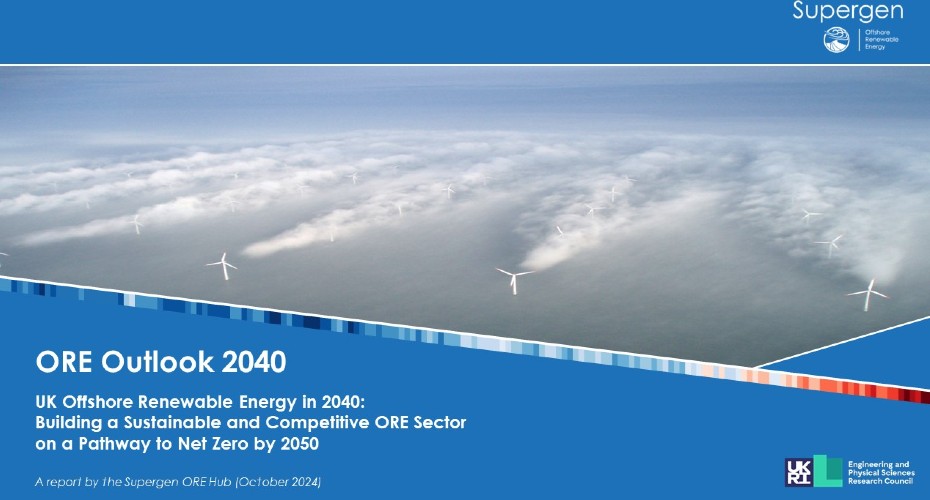New report: UK Offshore Renewable Energy in 2040: Building a Sustainable and Competitive ORE Sector on a Pathway to Net Zero by 2050

The latest report from the Supergen Offshore Renewable Energy (ORE) Hub emphasises the urgent need for a new approach to ensure the ORE sector can fulfil its critical role in our energy system
The latest report from the Supergen Offshore Renewable Energy (ORE) Hub emphasises the urgent need for a new approach to ensure the ORE sector can fulfil its critical role in our energy system.
To meet Net Zero targets, the UK must significantly accelerate ORE development. Current project timelines are too slow and immediate solutions are needed to upscale and optimise ORE systems and technologies.
The report focuses on key areas requiring change; the consenting process, workforce, supply chain and infrastructure. Investment in research and innovation will be the driving force behind the ORE sector’s growth – de-risking new technologies, reducing costs, and improving performance.
Moreover, an emphasis on research and innovation are vital for underpinning economic development and enhancing the competitiveness of the UK supply chain, ensuring the country retains its technological leadership on the global stage.
The Supergen ORE Hub plays a key role in driving forward innovative, game-changing research and creating collaborative ties between industry, academia and policy.
Prof Philipp Thies, Professor of Renewable Energy and Co-Directors of the Supergen ORE Hub said: “The UK’s last coal fired power station has closed last month. This report maps the new era of offshore renewable energy as primary source of energy for the UK, in order to reach the country’s Net Zero ambitions by 2040.
“It is a call to action for all stakeholders: Compared to where we are in the UK today, our installed capacity needs to increase seven times, the rate of building offshore renewable energy must accelerate by a factor of 4 and we urgently need 6 times as many people to enter the sector, compared to the current workforce.
“The report shows the challenge ahead, which is surmountable with investment in R&D as well as in skills provision. Offshore Energy can be a lifelong career for a generation, importantly not just for engineers.
“As part EPSRC Supergen ORE Hub, the University of Exeter is working at the research frontier, modelling the complex behaviour of floating offshore wind turbines and testing critical components, including moorings and dynamic power cables.
“Importantly, we educate the work force to deliver ambitious project such as the Celtic Sea with specialised BEng / MEng programs in Energy Engineering and our specialised postgraduate MSc Renewable Energy Engineering with a focus on offshore wind energy.”



